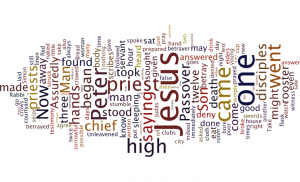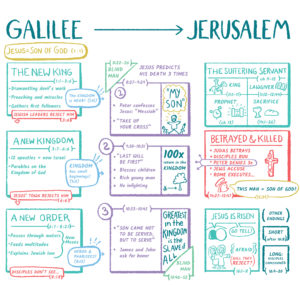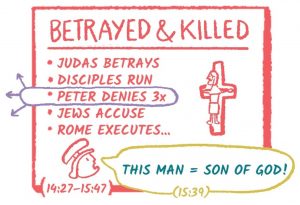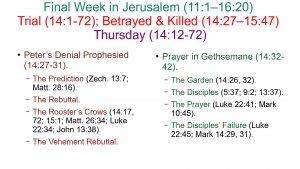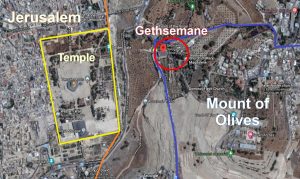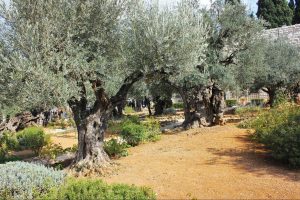Jesus’ Final Week in Jerusalem
Mark 11:1–16:20
Teaching (11:1–13:37)
King (11:1-11)
Sunday: Triumphal Entry (11:1-11).
Lawgiver (11:12–12:44)
Monday (11:12-19).
Tuesday (11:20–14:2).
Prophet (13:1-37)
Trial (14:1-72)
Sacrifice (14:1-26)
Thursday (14:12-72)
The Passover (14:12-21).
The Last Supper (14:22-26).
Betrayed and Killed (14:27–15:47)
Peter’s Denial Prophesied (14:27-31).
The prediction (14:27-28).

Credit: Overviewbible.com Jesus predicts that His disciples, the remaining Eleven, would deny Him, further proving that He was not afraid of making predictions.
He even cites a passage proving what He was saying (Zech. 13:7).
The latter half of Zechariah is full of prophecies concerning Jesus, as Jesus cites it several times in the events surrounding His death and resurrection.
Zechariah foretells of this event, saying, “Strike the shepherd, and the sheep will be scattered.”
In Zechariah, it is in the imperative, as if it is a command from God, but Jesus quotes it as something the speaker would do—1st person singular.
So in Zechariah, it is not a command per se, but a conditional: “If the shepherd is struck, then the sheep will be scattered.”
Jesus here lets us know that God has a role in striking Jesus down—after all, He is the one to pay for our sins and our iniquities as God exercises His wrath on Jesus on our account.
 The sheep, i.e. the disciples, would be scattered and stumble about, not having anyone to guide or direct them.
The sheep, i.e. the disciples, would be scattered and stumble about, not having anyone to guide or direct them.Why do you suppose that Jesus would tell them about this? Is it simply to further prove His abilities or to show off His understanding of Scripture?
No, it is better to know that your future failure is expected, but Jesus knows about it and yet He still chose you.
It would no doubt be an encouragement later when Peter and the disciples remember that Jesus said this.
And had Jesus mentioned it earlier, it may have discouraged them from being His disciples in the first place.
Jesus then predicts something else, that after His resurrection, He will join them in Galilee.
This is quite interesting, as He is treating His resurrection as a foregone conclusion and telling them what will happen afterward.
He also presumes that after the disciples scatter, they will all return home to Galilee.
Recall, Jesus had called Peter, Andrew, James, and John as they were tending their nets as fishermen on the Sea of Galilee. Matthew He met up with later not far from there. They would all go home, and we find many of them resuming their old vocation.
And He would, indeed, meet them later in Galilee where He gives the Great Commission (Matt. 28:16).
Brash Peter gets defensive and prideful.
It feels that way anyway. Would you describe this as defensive?
In fact, he was just told earlier at supper that one of them would betray Jesus, as if being scattered was less believable.
Perhaps it was the more general way in which Jesus presented this, that all of them would stumble as opposed to just one betraying Him.
But Peter, being the brash one, the spokesman, and one of the closest disciples, says this won’t happen to him.
Are we ever like that? Do we ever get prideful and say we would never fall for something or sin in a particular way? “No, that happens to other people, not me,” we might say. How often do we fall for it?
You’re no better than they are, just as Peter was no better than the other disciples.
Then Jesus gets personal with Peter.
The rooster’s crows (14:30).
“You think you won’t stumble? No, it’s worse—you will deny Me!” Jesus says.
Not only that, but you will deny Me this very night.
Evening had come before supper (14:17), so they were well into the night by this point.
And Jesus gives a sign as to when these denials would take place: before the rooster crows twice.
In the other gospel accounts, it only mentions one of the rooster’s crows.
I have found conflicting information out there on when the rooster crows, and no wonder. It’s an animal that can be somewhat unpredictable.
Of course we all know the primary time of day when the rooster crows—just before dawn.
And this is is the second one that Jesus is referring to, especially since in each account, the very next thing that happens is morning has come (14:72–15:1).
The earlier one is said to occur sometime after midnight, but since most people are in a deep sleep by this point we pay little mind to it.
Of course Jesus, His disciples, and the kangaroo court that was called were awake and eager to try Jesus, as we’ll see.
We will talk more about this as we get there.
Again, why do you think Jesus would reveal this to Peter and the others? For the same reasons as before, or is it something else?
If for another reason, then to humble Peter and to let him know he isn’t all he thinks he is—and that’s okay.
We all stumble from time to time—we just need to remember to get back up!
The vehement rebuttal (14:31).
In any event, Peter doubles down, vehemently disregarding Jesus’ words.
Boy, the Scripture has a way of holding a mirror up to you, doesn’t it? How many times do we vehemently deny what He’s telling us in the Scripture?
He’s saying, “I heard you, Jesus, but you’re wrong!”
Wow! To tell Jesus He is wrong! Peter certainly earns his reputation as brash here, doesn’t he?
He even goes so far as to say that he would be willing to die for Jesus! Be careful what you say.
And what’s more amazing is they all joined in on this. Even after Jesus told them point blank that they would all scatter, instead of taking Jesus’ lead, they take Peter’s.
Jesus doesn’t react to this, at least not where it’s recorded.
It’s as if Jesus is saying, “We’ll see. They mean well, but we’ll see.”
 Prayer in Gethsemane (14:32-42).
Prayer in Gethsemane (14:32-42).The Garden.
Of course, we know this is the Garden of Gethsemane.
Gethsemane is Aramaic for “olive press,” which is an indication that this was a grove of olive trees at the base of the Mount of Olives.
So when the Bible says they go out to the Mount of Olives, and the next time we see them is in this garden, that’s why (14:26, 32).
It was nice, quiet, and dark, while still being somewhat illuminated by the city lights—an ideal place to sit and pray by the temple.
It was also ideal for the guards to come and arrest Him.
There is an indication in Luke’s account that this was a place Jesus and His disciples often came to to pray.
Judas had been here many times as well with them, and knew just where to look for Jesus.
Jesus, instead of running from His duty, came here anyway and allowed Himself to be caught—despite His ardent pleas toward God.
As they approach this garden, Jesus asks eight of the remaining eleven to stay behind, perhaps near the entrance of the garden.
Then He takes those of the inner inner circle, Peter, James, and John, to go a little farther.
This is the third time recorded in Mark that these three go with Him while the others remain behind.
The first was when He raises Jairus’ daughter (5:37) and the second was to witness the Transfiguration (9:2).
Jesus expresses His deep sorrow at this time, as if to say, “I’m so sad, it’s killing me.”
Then He asks His closest friends to keep watch with Him.
This is not unlike the command He gave at an earlier moment on the Mount of Olives toward the end of the Olivet Discourse: “And what I say to you, I say to all: Watch!” (13:37).
This is a moment of great need our Lord had, and we’ll find these three are not up to the task.
The Prayer.
He went a little farther, Luke says a stone’s throw from the three (Luke 22:41), fell down and prayed.
It was within eyeshot, but barely within earshot depending on how loud you are speaking through this olive grove.
Jesus knew what He was about to endure—as we said a moment ago, He had let Himself be caught.
But that didn’t mean He wasn’t struggling with it.
Have you ever known you were about to face something you weren’t going to enjoy, but you knew it was necessary?
This is by far an understated comparison, but it’s kinda like ripping a band-aid off. In fact that’s almost become a phrase for us: “Just rip that band-aid off.”
The idea is that doing it all at once may hurt, but it won’t be as prolonged as taking it off slowly—and it’s gotta come off.
But just before doing it, you are dreading it despite knowing that it’s better in the long run.
Of course, dying on the cross is exponentially worse than ripping off a band-aid, but the concept is similar.
It’s better to take care of it now than prolonging the suffering, but that doesn’t mean He doesn’t want to do it.
His earthly flesh is warring with His sense of duty and purpose.
As Bro. Wayne Jones words it: “There is no doubt that Jesus was engaged [in] a spiritual battle wherein the internal conflict of the flesh seeking to avoid the extreme pain of the cross was in conflict with the mission of the Messiah to come and do the will of the Father. His prayer was an expression this battle and exhibited a strong desire to settle the matter once and for all” (Jones 154).
How many times have we talked about the purpose statements of Jesus, and the fact that He was meant to “give His life a ransom for many” (10:45).
This is the thematic verse of Mark’s gospel, and it is on display here. He knows what He has to do, but He is scared—can you blame Him?
